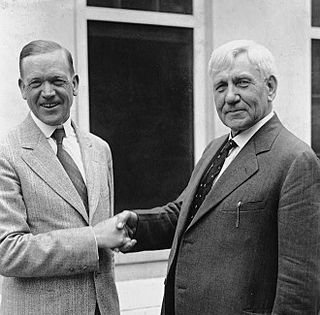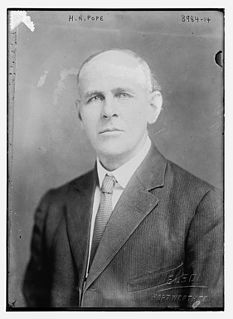
A farmer is a person engaged in agriculture, raising living organisms for food or raw materials. The term usually applies to people who do some combination of raising field crops, orchards, vineyards, poultry, or other livestock. A farmer might own the farm land or might work as a laborer on land owned by others. In most developed economies, a "farmer" is usually a farm owner (landowner), while employees of the farm are known as farm workers. However, in other older definitions a farmer was a person who promotes or improves the growth of plants, land or crops or raises animals by labor and attention.

The United States Department of Agriculture (USDA) is the federal executive department responsible for developing and executing federal laws related to farming, forestry, rural economic development, and food. It aims to meet the needs of commercial farming and livestock food production, promotes agricultural trade and production, works to assure food safety, protects natural resources, fosters rural communities and works to end hunger in the United States and internationally. It is headed by the Secretary of Agriculture, who reports directly to the President of the United States and is a member of the president's Cabinet. The current secretary is Tom Vilsack, who has served since February 24, 2021.

The National Agricultural Statistics Service (NASS) is the statistical branch of the U.S. Department of Agriculture and a principal agency of the U.S. Federal Statistical System. NASS has 12 regional offices throughout the United States and Puerto Rico and a headquarters unit in Washington, D.C. NASS conducts hundreds of surveys and issues nearly 500 national reports each year on issues including agricultural production, economics, demographics and the environment. NASS also conducts the United States Census of Agriculture every five years.
The Agricultural Marketing Service (AMS) is an agency of the United States Department of Agriculture; it maintains programs in five commodity areas: cotton and tobacco; dairy; fruit and vegetable; livestock and seed; and poultry. These programs provide testing, standardization, grading and market news services for those commodities, and oversee marketing agreements and orders, administer research and promotion programs, and purchase commodities for federal food programs. The AMS enforces certain federal laws such as the Perishable Agricultural Commodities Act and the Federal Seed Act. The AMS budget is $1.2 billion. It is headquartered in the Jamie L. Whitten Building in Washington, D.C.
The Michigan Farm Bureau was founded on the campus of Michigan State University in 1919. The organization's primary goal is to promote and represent the interests of its agricultural members within the state of Michigan.

The McNary–Haugen Farm Relief Act, which never became law, was a controversial plan in the 1920s to subsidize American agriculture by raising the domestic prices of farm products. The plan was for the government to buy the wheat and then store it or export it at a loss. It was co-authored by Charles L. McNary (R-Oregon) and Gilbert N. Haugen (R-Iowa). Despite attempts in 1924, 1926, 1927, and 1931 to pass the bill, it was vetoed by President Calvin Coolidge, and not approved. It was supported by Secretary of Agriculture Henry Cantwell Wallace and Vice President Charles Dawes.

National Farmers Union is a national federation of state Farmers Union organizations in the United States. The organization was founded in 1902 in Point, Texas, and is now headquartered in Washington, D.C. Today, the organization continues its original mission: to protect and enhance the economic well-being and quality of life for family farmers and ranchers and their rural communities. It does this by promoting legislation and education beneficial to farmers, and by developing cooperative buying and selling methods and businesses. The current president is Rob Larew, and the vice president is Jeff Kippley. Former NFU Presidents have included Roger Johnson, Tom Buis, and David Frederickson.
Catherine "Cathy" Bertini is an American public servant. She is the 2003 World Food Prize Laureate. She was the Executive Director of the United Nations World Food Program from 1992 to 2002. She served as the UN Under-Secretary for Management from 2003 to 2005. Currently she is a distinguished fellow at the Chicago Council on Global Affairs, the Chair of the Board of the Global Alliance for Improved Nutrition (GAIN) and the Chair of the Executive Board of the Crop Trust.
American Farmland Trust is a nonprofit organization in the United States that works to protect farmland, promote environmentally sound farming practices, and keep farmers on the land. AFT is staffed by farmers, policy experts, researchers and scientists, and governed by a board of directors. Its headquarters are in Washington, D.C., and it has regional offices throughout the country. AFT also runs the Farmland Information Center, an online collection of information on farmland and ranchland protection and stewardship established as a public-private partnership with the USDA Natural Resources Conservation Service.
Sam Dryden was a thought leader and advocate for food and nutrition security, with a particular focus on small-holder farmer led agricultural development in Africa and Asia. Lately Dryden was a Fellow at Imperial College, working on a project to promote digital technologies that can catalyse sustainable agricultural transformation across the food system in Africa.
To address the prevalence of food deserts and diet-related illness in the U.S. state of New York, and to promote sustainable, Local food, the New York State Food Policy Council was founded on May 20, 2007 by Governor Eliot Spitzer’s Executive Order No. 13. The council coordinates state agriculture policy and makes recommendations to the governor regarding policies that will ensure the availability of safe, fresh, nutritious, and affordable food for New Yorkers. While focusing on increasing access to healthy food options for low-income residents, seniors, and children, the council also works to promote New York agricultural products to New York consumers, with a special emphasis on expanding the consumer market for organic food.

The Louisiana State University Agricultural Center, or the LSU AgCenter, is an agriculture research center associated with the Louisiana State University System and headquartered in Baton Rouge, Louisiana. The center conducts agricultural-based research through its Louisiana Agricultural Experiment Station and extends the knowledge derived from research to the people of the state of Louisiana through its Louisiana Cooperative Extension Service. The LSU AgCenter, one of 11 institutions within the Louisiana State University System, shares physical facilities with the LSU A&M campus.
The IATP Food and Society Fellows Program provides two-year, part-time fellowships to professionals working to address health, social justice, economic viability, environmental, and other issues in food and farming systems. The program started in 2001 as a collaboration between the Jefferson Institute and the Institute for Agriculture and Trade Policy (IATP), with the guidance and support of the W.K. Kellogg Foundation. The program is currently administered by IATP and funded by the W.K. Kellogg Foundation and the Woodcock Foundation. Generally, 8-12 fellows are selected each year; 72 fellows have been selected through 2009.
The Oklahoma Farm Bureau (OKFB) is a nonprofit organization dedicated to promoting, protecting, and representing the interests of farmers and ranchers in Oklahoma and is the largest farm organization in the State. OKFB is the Oklahoma level partner of the American Farm Bureau Federation (AFBF).
James Lee Reese is a farmer, businessman and politician from the U.S. state of Oklahoma. Appointed by Republican Governor Mary Fallin as Oklahoma Secretary of Agriculture, Reese was sworn into office on January 10, 2011. He also acted as Fallin's chief advisor on policy development and implementation related to agriculture, food, and forestry. Reese serves concurrently in Oklahoma City as the commissioner of the Oklahoma Department of Agriculture.

Texas Farm Bureau, Texas's largest farm organization, represents the interests of agricultural producers and rural communities across Texas as the "Voice of Texas Agriculture." Texas Farm Bureau's grassroots structure begins in local communities across the state of Texas. The non-profit organization's direction and decision making are dictated by its members.
The Stephenson Disaster Management Institute at Louisiana State University is located in the Stephenson National Center for Security Research and Training at LSU.
This Week in Louisiana Agriculture, or TWILA, is an agricultural television series produced by the Louisiana Farm Bureau Federation based in Baton Rouge, Louisiana. The 30-minute weekly program airs across Louisiana and nationwide on the RFD-TV network. TWILA's team of reporters and producers tell the story of Louisiana agriculture from the perspective of both farmers and consumers.
The Big River Economic and Agricultural Development Alliance, most commonly referred to as BREADA, is a non-profit organization with headquarters in Baton Rouge, Louisiana. BREADA is the parent organization of the Red Stick Farmers Market and the Main Street Market.

Ralph Lee Abraham Jr. is an American physician and politician who served as the U.S. representative for Louisiana's 5th congressional district from 2015 to 2021. A member of the Republican Party, he is a native and resident of Alto, Louisiana.









